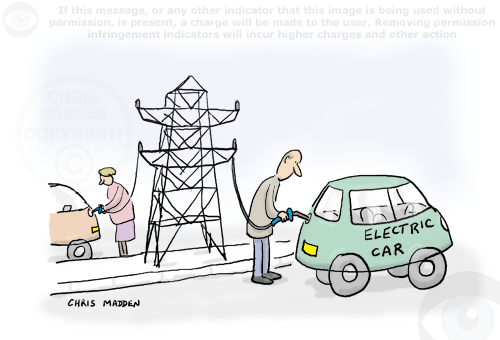Electric Vehicle Obsession is Far From Being Clean or Green
by Rudy P. SysAdmin at howtofindthemoneyElectric vehicles (EVs) are currently being praised as alternatives to conventional fossil fuel-based transportation. But seldom do the proponents of EVs talk about the major disadvantages and damages that could arise from using them at a large scale.
Are there really major drawbacks to using EVs? You bet!
Here we’ll take a look at some really uncomfortable facts, and even some dangerous consequences, that are underreported in the mainstream media.
Not Clean and Not Green
The biggest selling point of EVs is that they run on a charged battery and not on gas. They are termed “clean” and “green,” since they don’t emit greenhouse gases when you drive them, as do cars and trucks powered by conventional internal combustion engines, which run on fossil fuels.
But in reality, EVs are far from being clean or green. Most of the EV battery-charging stations are supplied with energy generated from fossil fuels or a grid connected to multiple power generation sources.

So technically, EVs are running on electricity generated from fossil fuels. They consume fossil fuels in the form of electricity.
Expensive and Impractical
It is not common to find EV charging stations with an exclusive supply of electricity from wind or solar.
Even if these cases, the resulting high demand of renewable sources will increase the overall price of electricity in the market, which is undesirable for the larger public. We know—from the examples of California, Denmark and Germany—that both wind and solar inadvertently cause an increase in the cost of power.
Furthermore, IONITY—one of Europe’s largest EV charging station networks—has increased its prices by a ridiculous amount in 2020.
Both wind and solar are intermittent sources and cannot produce electricity all the time. Systems that rely on them either need to be connected to the grid or use very expensive battery backup.
Moreover, the global energy infrastructure is predominantly fossil fuel-based, and there is no way for even developed countries to have all their EV stations completely run by wind or solar energy.
India and China, though they are adopting EV, have also simultaneously increased their dependency on fossil fuels for power generation. Even Japan, one of the most advanced Asian nations, is planning to build 22 new coal plants in the near future.
The Dark Side of EV Batteries
Proponents of EVs never mention the damages associated with the mining of the raw materials used in their batteries.
A sudden surge in demand for cobalt—the essential component of batteries—has resulted in inhumane and unethical mining practices in the less-developed countries of the world.
Sixty percent of total cobalt production globally comes from the Democratic Republic of the Congo (DRC). But most of the mines there use unregulated labor.
The DRC currently employs nearly 40,000 children in its cobalt mines every day, exposing them to potentially fatal respiratory diseases. At least dozens of individuals have perished in these cobalt mines.
The U.S. Department of Labor highlighted the “worst forms of child labor” in the DRC in 2018, yet U.S. EV car makers such as Tesla—which takes pride in saving the world from fossil fuels—are content selling batteries made from these cobalt mines.
These batteries are definitely not clean and have blood stains on them. The only way to avoid that is by using cobalt from other countries, like Australia. But the current demand cannot be met from the 40 percent of cobalt found outside the DRC.
EV vehicles may appear to be a harmless and cleaner form of transportation. But in essence, they have fundamental manufacturing and operational issues that make them no better than fossil-fueled vehicles, and in some cases, worse.
The 10 largest coal producers and exporters in Indonesia:
Sponsor Ads
Created on Feb 18th 2020 16:48. Viewed 754 times.
Comments
No comment, be the first to comment.



